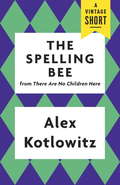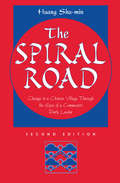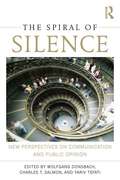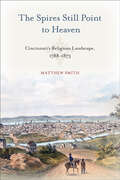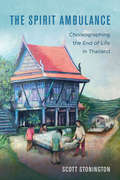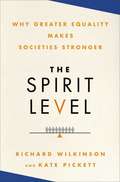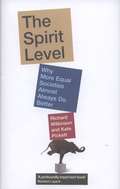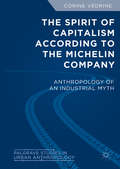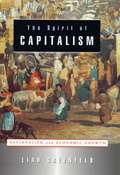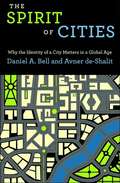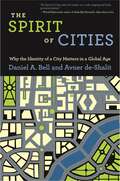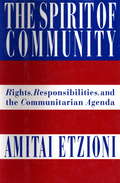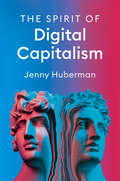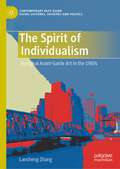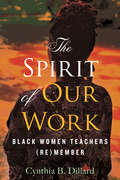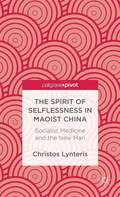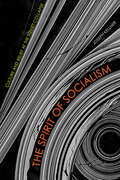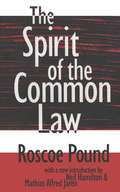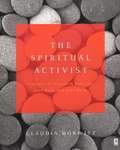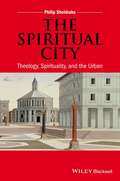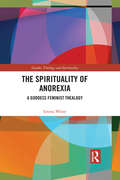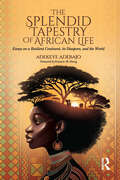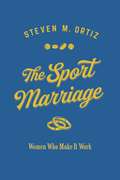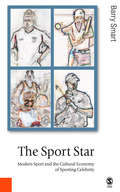- Table View
- List View
The Spell of Capital: Reification and Spectacle
by Samir Gandesha Johan F. HartleThis book explores the tradition, impact, and contemporary relevance of two key ideas from Western Marxism: Georg Lukács's concept of reification, in which social aspects of humanity are viewed in objectified terms, and Guy Debord's concept of the spectacle, where the world is packaged and presented to consumers in uniquely mediated ways. Bringing the original, yet now often forgotten, theoretical contexts for these terms back to the fore, Johan Hartle and Samir Gandesha offer a new look at the importance of Western Marxism from its early days to the present moment-and reveal why Marxist cultural critique must continue to play a vital role in any serious sociological analysis of contemporary society.
The Spelling Bee
by Alex KotlowitzAn eBook short.A selection from Alex Kotlowitz's masterpiece of immersive reportage There Are No Children Here, the harrowing coming-of-age story of two children in Chicago's Henry Horner Public Housing Complex. In "The Spelling Bee," as Pharoah returns to school, his dreams come up against the realities of his neighborhood. Pharoah is small of stature, has a stutter, and frequently reads at night until his eyes hurt. He has his mother's open and generous smile, and his father's charm and keen intellect. As he enters fourth grade, he sets a solemn goal for himself: to become a spelling bee champion. Award-winning journalist Alex Kotlowitz follows Pharoah for two years, as he tries desperately to succeed at school while navigating the perils of his devastated neighborhood, a place marked by deep need and neglect, along with unrelenting violence. For Pharoah, spelling is just the beginning. This is a dramatic and groundbreaking portrait of poverty, the story of growing up in the other America.
The Spiral Road
by Huang Shu-Min Shu-Min HuangThrough the eyes of the leading Party cadre in Lin Village in southeast China, this book unravels the turbulent events that affected individuals and families in the village: the downfall of the landlords during the Land Reform, the rise to political power of poor peasants, the political fanaticism of the Great Leap Forward and the Great Proletarian Cultural Revolution, and recent efforts to restore rational, pragmatic policies in ChinaOCOs countryside. The second edition includes two new chapters, based on the authorOCOs continuing visits to China. One chapter details changes in Lin Village, such as Taiwanese investment of capital, large-scale production, international marketing, and new lifestyles. The other focuses on the continuing story of Mr. Ye: his ideas for expanding the villagersOCO wealth, his wheeling and dealing to set up lucrative businesses in Lin Village, and his arrangements to secure jobs for his family members and close kin. "
The Spiral of Silence: New Perspectives on Communication and Public Opinion
by Wolfgang Donsbach Charles T. Salmon Yariv TsfatiSince its original articulation in the early 1970s, the 'spiral of silence' theory has become one of the most studied theories of communication and public opinion. It has been tested in varied sociopolitical contexts, with different issues and across communication systems around the world. Attracting the interest of scholars from communication, political science, sociology, public opinion and psychology, it has become both the subject of tempestuous academic debate as well as a mainstay in courses on communication theory globally. Reflecting substantial new thinking, this collection provides a comprehensive examination of the spiral of silence theory, offering a synthesis of prior research as well as a solid platform for future study. It addresses various ideological and methodological criticisms of the theory, links the theory with allied areas of scholarship, and provides analyses of empirical tests. Contributors join together to present a breadth of disciplinary and international perspectives. As a distinctive and innovative examination of this influential theory, this volume serves as a key resource for future research and scholarship in communicaiton, public opinion, and political science.
The Spires Still Point to Heaven: Cincinnati's Religious Landscape, 1788–1873 (Urban Life, Landscape and Policy)
by Matthew SmithA case study about the formation of American pluralism and religious liberty, The Spires Still Point to Heaven explores why—and more importantly how—the early growth of Cincinnati influenced the changing face of the United States. Matthew Smith deftly chronicles the urban history of this thriving metropolis in the mid-nineteenth century. As Protestants and Catholics competed, building rival domestic missionary enterprises, increased religious reform and expression shaped the city. In addition, the different ethnic and religious beliefs informed debates on race, slavery, and immigration, as well as disease, temperance reform, and education. Specifically, Smith explores the Ohio Valley’s religious landscape from 1788 through the nineteenth century, examining its appeal to evangelical preachers, abolitionists, social critics, and rabbis. He traces how Cincinnati became a battleground for newly energized social reforms following a cholera epidemic, and how grassroots political organizing was often tied to religious issues. He also illustrates the anti-immigrant sentiments and anti-Catholic nativism pervasive in this era. The first monograph on Cincinnati’s religious landscape before the Civil War, The Spires Still Point to Heaven highlights Cincinnati’s unique circumstances and how they are key to understanding the cultural and religious development of the nation.
The Spirit Ambulance: Choreographing the End of Life in Thailand (California Series in Public Anthropology #49)
by Scott StoningtonThe Spirit Ambulance is a journey into decision-making at the end of life in Thailand, where families attempt to craft good deaths for their elders in the face of clashing ethical frameworks, from a rapidly developing universal medical system, to national and global human-rights politics, to contemporary movements in Buddhist metaphysics. Scott Stonington’s gripping ethnography documents how Thai families attempt to pay back a "debt of life" to their elders through intensive medical care, followed by a medically assisted rush from the hospital to home to ensure a spiritually advantageous last breath. The result is a powerful exploration of the nature of death and the complexities arising from the globalization of biomedical expertise and ethics around the world.
The Spirit Level: Why Greater Equality Makes Societies Stronger
by Robert B. Reich Kate Pickett Richard WilkinsonThis eye-opening UK bestseller shows how one single factor--the gap between its richest and poorest members--can determine the health and well-being of a society. "This is a book with a big idea, big enough to change political thinking."--Sunday Times.
The Spirit Level: Why More Equal Societies Almost Always Do Better
by Kate Pickett Richard WilkinsonEveryone knows that the poor in rich societies are more likely to have shorter, less healthy, lives, to do less well at school and to end up on the wrong side of the law. But The Spirit Level goes further than this, to demonstrate for the first time that a whole range of social problems - from poor health to educational failure, from mental illness to obesity, from drug addition to violence, from teenage births to the weakening of community life - share one overwhelming feature: they are all several times more common in more unequal societies. The evidence that bigger income differences create more problems is conclusive. And rather than affecting just the poor, inequality reduces the quality of life for everyone in less equal. This groundbreaking work book, based on 30 years research by two of the UK's leading social epidemiologists, provides a powerful and fascinating new perspective on the social failings of rich societies. In light of their findings government policy will need serious rethinking.
The Spirit of Capitalism According to the Michelin Company: Anthropology of an Industrial Myth (Palgrave Studies in Urban Anthropology)
by Corine VédrineThe city of Clermont-Ferrand in central France is inextricably linked to the global tire company Michelin—not only by the industrial, social, and economic realities that tie employees to employer, but also by a multi-generational, regional belief in the company’s entrepreneurial mythos, the so-called “Michelin spirit.” Since the 1980s, transformations in capitalist systems have challenged the Michelin ideology: the end of corporate paternalism, the reduction of the work force, and a new wave of managers have left employees in the region feeling the sting of abandonment. Even in the face of these significant changes, however, the ethnographic enquiry at the heart of this book testifies to the enduring strength of the “spirit of capitalism”: even as the bonds between employees, companies, and their regions are undergoing significant transformation, entrepreneurial myths endure—in part in fear of the end of a secure, organizing structure.
The Spirit of Capitalism: Nationalism and Economic Growth
by Liah GreenfeldThe Spirit of Capitalism answers a fundamental question of economics, a question neither economists nor economic historians have been able to answer: what are the reasons (rather than just the conditions) for sustained economic growth? Taking her title from Max Weber's famous study on the same subject, Liah Greenfeld focuses on the problem of motivation behind the epochal change in behavior, which from the sixteenth century on has reoriented one economy after another from subsistence to profit, transforming the nature of economic activity. A detailed analysis of the development of economic consciousness in England, the Netherlands, France, Germany, Japan, and the United States allows her to argue that the motivation, or "spirit," behind the modern, growth-oriented economy was not the liberation of the "rational economic actor," but rather nationalism. Nationalism committed masses of people to an endless race for national prestige and thus brought into being the phenomenon of economic competitiveness. Nowhere has economic activity been further removed from the rational calculation of costs than in the United States, where the economy has come to be perceived as the end-all of political life and the determinant of all social progress. American "economic civilization" spurs the nation on to ever-greater economic achievement. But it turns Americans into workaholics, unsure of the purpose of their pursuits, and leads American statesmen to exaggerate the weight of economic concerns in foreign policy, often to the detriment of American political influence and the confusion of the rest of the world.
The Spirit of Cities: Why the Identity of a City Matters in a Global Age
by Daniel A. Bell Avner De-ShalitCities shape the lives and outlooks of billions of people, yet they have been overshadowed in contemporary political thought by nation-states, identity groups, and concepts like justice and freedom. The Spirit of Cities revives the classical idea that a city expresses its own distinctive ethos or values. In the ancient world, Athens was synonymous with democracy and Sparta represented military discipline. In this original and engaging book, Daniel Bell and Avner de-Shalit explore how this classical idea can be applied to today's cities, and they explain why philosophy and the social sciences need to rediscover the spirit of cities. Bell and de-Shalit look at nine modern cities and the prevailing ethos that distinguishes each one. The cities are Jerusalem (religion), Montreal (language), Singapore (nation building), Hong Kong (materialism), Beijing (political power), Oxford (learning), Berlin (tolerance and intolerance), Paris (romance), and New York (ambition). Bell and de-Shalit draw upon the richly varied histories of each city, as well as novels, poems, biographies, tourist guides, architectural landmarks, and the authors' own personal reflections and insights. They show how the ethos of each city is expressed in political, cultural, and economic life, and also how pride in a city's ethos can oppose the homogenizing tendencies of globalization and curb the excesses of nationalism. The Spirit of Cities is unreservedly impressionistic. Combining strolling and storytelling with cutting-edge theory, the book encourages debate and opens up new avenues of inquiry in philosophy and the social sciences. It is a must-read for lovers of cities everywhere.
The Spirit of Cities: Why the Identity of a City Matters in a Global Age
by Daniel A. Bell Avner de-ShalitA lively and personal book that returns the city to political thoughtCities shape the lives and outlooks of billions of people, yet they have been overshadowed in contemporary political thought by nation-states, identity groups, and concepts like justice and freedom. The Spirit of Cities revives the classical idea that a city expresses its own distinctive ethos or values. In the ancient world, Athens was synonymous with democracy and Sparta represented military discipline. In this original and engaging book, Daniel Bell and Avner de-Shalit explore how this classical idea can be applied to today's cities, and they explain why philosophy and the social sciences need to rediscover the spirit of cities.Bell and de-Shalit look at nine modern cities and the prevailing ethos that distinguishes each one. The cities are Jerusalem (religion), Montreal (language), Singapore (nation building), Hong Kong (materialism), Beijing (political power), Oxford (learning), Berlin (tolerance and intolerance), Paris (romance), and New York (ambition). Bell and de-Shalit draw upon the richly varied histories of each city, as well as novels, poems, biographies, tourist guides, architectural landmarks, and the authors' own personal reflections and insights. They show how the ethos of each city is expressed in political, cultural, and economic life, and also how pride in a city's ethos can oppose the homogenizing tendencies of globalization and curb the excesses of nationalism.The Spirit of Cities is unreservedly impressionistic. Combining strolling and storytelling with cutting-edge theory, the book encourages debate and opens up new avenues of inquiry in philosophy and the social sciences. It is a must-read for lovers of cities everywhere. In a new preface, Bell and de-Shalit further develop their idea of "civicism," the pride city dwellers feel for their city and its ethos over that of others.
The Spirit of Community
by Amitai EtzioniAmerica needs to move from me to we. In The Spirit of Community, renowned professor and former White House Fellow Amitai Etzioni, the founder of the Communitarian movement, lays out a blueprint for how in the 1990s Americans can move forward--together. The Spirit of Community calls for a reawakening of our allegiance to the shared values and institutions that sustain us--from our marriages and families to our schools and our neighborhoods, and extending to our nation itself. In proposing a new balance between our rights as individuals and our social responsibilities, this controversial, groundbreaking book articulates the emerging social attitudes of the nineties. We have many rights as individuals, Etzioni declares, but we have responsibilities to our communities, too. The right to be tried before a jury of our peers, for instance, is connected to our willingness to serve on one. We as a nation have in recent years forgotten such basic truths of our democratic social contract. And what we need now is a revival of the idea that small sacrifices by individuals can create large benefits for all of us. We must have the moral responsibility to respect our families and fight to preserve them, to value our children and their futures, and to be willing to espouse and teach commonly held moral values. Etzioni faces the tough issues that arise when the rights of individuals are weighed against those of the community, from free speech versus restrictions on hate speech to the right of police to conduct random checks of motorists' sobriety, from drug and HIV testing to mandatory national service. A movement that has already attracted the attention of policymakers as varied as Al Gore, Daniel Patrick Moynihan, Jack Kemp, and Henry Cisneros, Communitarianism provides a call to action and a perceptive analysis of American politics and society today. And The Spirit of Community is vital reading for any American who is engaged with the future of the country in the next decade.
The Spirit of Digital Capitalism
by Jenny HubermanDigital technologies are now central to the machinations of capitalism. How are they giving rise to new forms of capital accumulation and domination? And in what terms are these changes being promoted and justified by a new and incredibly powerful elite? This book takes on such questions. Beyond demonstrating how digital technologies make new forms of capital accumulation possible, Huberman interrogates the ideological transformations that have accompanied the emergence of digital capitalism. She examines how business gurus, entrepreneurs, and venture capitalists make claims about how digital technologies contribute to the common good, foster collaboration and connectivity, and render life more convenient, even if this convenience comes at the expense of values such as privacy and liberty. Ultimately, Huberman argues that the spirit of digital capitalism is Janus-faced and reveals deeper cultural contradictions at the heart of contemporary American society: promising, in the same moment, to liberate us and surveil us, enrich us, and yet render our lives more economically precarious. Smart and thought-provoking, this book offers new perspectives that will speak to anyone interested in the contours of contemporary capitalism, particularly students and scholars of economic anthropology and sociology.
The Spirit of Individualism: Shanghai Avant-Garde Art in the 1980s (Contemporary East Asian Visual Cultures, Societies and Politics)
by Lansheng ZhangThis book is about avant-garde art in Shanghai in the 1980s which challenges the narrative in the current discourse on the appearance of contemporary art in China. Offering fresh perspectives and new insights into the art and the artists of this period, the book includes critical events in Shanghai, that will attract the serious attention of art professionals and collectors. The emergence of the Shanghai art scene in the 1980s mirrors the revitalisation of Shanghai that was tasked to lead China’s economic development trajectory onto the world stage. Shanghai, with its semi-colonial, political, economic and cultural history, including the strong legacy of the early twentieth century modernist art movement, has played a vital role in China’s modernisation and presents itself as a unique case in the evolution of contemporary art in China.
The Spirit of Our Work: Black Women Teachers (Re)member
by Cynthia DillardAn exploration of how engaging identity and cultural heritage can transform teaching and learning for Black women educators in the name of justice and freedom in the classroomIn The Spirit of Our Work, Dr. Cynthia Dillard centers the spiritual lives of Black women educators and their students, arguing that spirituality has guided Black people throughout the diaspora. She demonstrates how Black women teachers and teacher educators can heal, resist and (re)member their identities in ways that are empowering for them and their students. Dillard emphasizes that any discussion of Black teachers&’ lives and work cannot be limited to truncated identities as enslaved persons in the Americas.The Spirit of Our Work addresses questions that remain largely invisible in what is known about teaching and teacher education. According to Dillard, this invisibility renders the powerful approaches to Black education that are imbodied and marshaled by Black women teachers unknown and largely unavailable to inform policy, practice, and theory in education. The Spirit of Our Work highlights how the intersectional identities of Black women teachers matter in teaching and learning and how educational settings might more carefully and conscientiously curate structures of support that pay explicit and necessary attention to spirituality as a crucial consideration.
The Spirit of Selflessness in Maoist China
by Christos LynterisAssuming power in 1949, the Chinese Communist Party was soon faced with a crucial problem: how to construct the socialist 'New Man'? Using Foucault's theory of 'technologies of the self', Lynteris examines the conflict between self-cultivation and the abolition of the self in the biopolitically neuralgic field of 'socialist medicine'.
The Spirit of Socialism: Culture and Belief at the Soviet Collapse
by Joseph KellnerThe Spirit of Socialism is a cultural history of the Soviet collapse. It examines the millions of Soviet people who, during the cascading crises of the collapse and the post-Soviet transition, embarked on a spirited and highly visible search for new meaning. Amid profound disorientation, these seekers found direction in their horoscopes, or behind gurus in saffron robes or apocalyptic preachers, or by turning from the most basic premises of official science and history to orient themselves anew. The beliefs they seized on and, even more, the questions that guided their search reveal the essence of late-Soviet culture and its legacy in post-Soviet Russia.To skeptical outsiders, the seekers appeared eccentric, deviant, and above all un-Soviet. Yet they came to their ideas by Soviet sources and Soviet premises. As Joseph Kellner demonstrates, their motley beliefs reflect modern values that formed the spiritual core of Soviet ideology, among them a high regard for science, an informed and generous internationalism, and a confidence in humanity to chart its own course. Soviet ideology failed, however, to unite these values in an overarching vision that could withstand historical change.And so, as The Spirit of Socialism shows, the seekers asked questions raised but not resolved by the Russian Revolution and subsequent Soviet order—questions of epistemic authority, of cultural identity, and of history's ultimate meaning. Although the Soviet collapse was not the end of history, it was a rupture of epochal significance, whose fissures extend into our own uncertain era.
The Spirit of the Common Law
by Roscoe PoundThe Spirit of the Common Law is one of Roscoe Pound's most notable works. It contains the brilliant lectures he delivered at Dartmouth College in the summer of 1921. It is a seminal book embodying the spiritual essence of sociological jurisprudence by its leading prophet. This work is both a celebration of the common law and a warning for common law judges and lawyers to return to and embrace the pragmatism and judicial empiricism that define and energize the common law. The two fundamental doctrines of the common law, Pound writes, are the doctrine of precedents and the doctrine of supremacy of law.In an earlier preface, Justice Arthur J. Goldberg writes that The Spirit of the Common Law will always be treasured by judges and lawyers for its philosophy and history, but more importantly for Roscoe Pound's optimism and faith in the capacity of law to keep up with the times without sacrificing fundamental values. It is a faith built upon the conviction that the present is not to be divorced from the past, but rather that the past and the present are to be built upon to make a better future. Neil Hamilton and Mathias Alfred Jaren provide a biographical introduction to the book. They discuss the various influences upon Pound's scholarly pursuits and they analyze many of his writings that led up to The Spirit of the Common Law. This volume is a necessary addition to the libraries of legal scholars and professionals, sociologists, and philosophers.
The Spiritual Activist: Practices to Transform Your life, your Work and Your World
by Claudia HorwitzPractical guide to individual and social transformation.
The Spiritual City: Theology, Spirituality and the Urban
by Philip SheldrakeA Spiritual City provides a broad examination of the meaning and importance of cities from a Christian perspective. Contains thought-provoking theological and spiritual reflections on city-making by a leading scholar Unites contemporary thinking about urban space and built environments with the latest in urban theology Addresses the long-standing anti-urban bias of Christianity and its emphasis on inwardness and pilgrimage Presents an important religious perspective on the potential of cities to create a strong human community and sense of sacred space
The Spirituality of Anorexia: A Goddess Feminist Thealogy (Gender, Theology and Spirituality)
by Emma WhiteWidely popularized images of unobtainable and damaging feminine ideals can be a cause of profound disjunction between women and their bodies. A consequence of this dissonance is an embodied performance of these ideals with the potential development of disordered eating practices, such as anorexia nervosa. This book develops a spirituality of anorexia by suggesting that these eating disorders are physical symptoms of the general repression of feminine nature in our culture. Furthermore, it puts forward Goddess feminism as a framework for a healing therapeutic model to address anorexia and more broadly, the "slender ideal" touted by society. The book focuses on the female body in contemporary society, specifically the development of anorexia nervosa, and what this expression communicates about female embodiment. Drawing upon the work of a variety of theorists, social commentators, liberation theologians and thealogians, it discusses the benefits of adopting female-focused myths, symbols and rituals, drawing upon the work of Marion Woodman and Naomi Goldenberg. Ultimately, it theorises a thealogical approach to anorexia aimed at displacing the damaging discourses that undermine women in the twenty-first century. Offering an alternative model of spirituality and embodiment for contemporary women, this book will be of keen interest to scholars of theology, religious studies, gender studies and psychology.
The Splendid Tapestry of African Life: Essays on a Resilient Continent, its Diaspora, and the World
by Adekeye AdebajoThe 145 essays in this comprehensive, concise, and highly readable book represent three decades of Adekeye Adebajo’s reflections and writing on the history, regional integration, politics, military rule, foreign policy, international relations, geo-politics, culture, film, sports, and travel of Africa and its diaspora. The legacies of this Black Atlantic in the Americas, Europe, and the Caribbean are examined panoramically, as Africa’s independence struggles from the 1950s were also mirrored by similar battles in the Caribbean and America’s civil rights struggle. The volume further assesses the world beyond global Africa from a Pan-African perspective. This book thus seeks to capture the zeitgeist of the post-apartheid era after the five-century quest for liberation from the twin scourges of the European-led transatlantic slavery and colonialism. The essays ultimately encapsulate Pan-African efforts to break the chains of Western slavery and colonial exploitation, and to assert global Africa’s own proud histories, cultures, and identities.Print edition not for sale in Sub-Saharan Africa.
The Sport Marriage: Women Who Make It Work (Sport and Society)
by Steven M. OrtizIn The Sport Marriage, Steven M. Ortiz draws on studies he conducted over nearly three decades that focus on the marital realities confronted by women married to male professional athletes. These women, who are usually portrayed in unflattering and/or unrealistic terms, face enormous challenges in their attempts to establish and maintain functional marital and family lives while the husband routinely puts his career first. Ortiz defines the traditional sport marriage as a career-dominated marriage, illustrating how it encourages women to contribute to their own subordination through adherence to an unwritten rulebook and a repertoire of self-management strategies. He explains how they make invaluable contributions to their husbands’ careers while adjusting to public life and trying to maintain family privacy, managing power and control issues, and coping with pervasive groupies, overinvolved mothers, a culture of infidelity, and husbands who prioritize team loyalty. He gives these historically silent women a voice, offering readers perceptive and sensitive insight into what it means to be a woman in the male-dominated world of professional sports.
The Sport Star: Modern Sport and the Cultural Economy of Sporting Celebrity (Published in association with Theory, Culture & Society)
by Barry SmartWhy are sport stars central to celebrity culture? What are the implications of their fame? Proceeding from a broadly based discussion of heroism, fame and celebrity, Smart addresses a number of prominent modern sports and sport stars, including Michael Jordan (basketball), David Beckham (football), Tiger Woods (golf), Anna Kournikova and the Williams sisters (tennis). He analyses the development of modern sport in the UK and USA, demonstrating the key economic and cultural factors that have contributed to the popularity of sport stars, while examining issues such as race and gender, the impact of professionalization, growing media coverage, the role of agents and the increasing presence of commercial corporations providing sponsorship and endorsement contracts. This book situates the sport star as the embodiment of the various tensions of age, class, race, gender and culture. It argues that sporting figures possess an increasingly rare quality of authenticity that gives them the capacity to lift and inspire people. The book is a major contribution to the sociology and culture of sport and celebrity.

